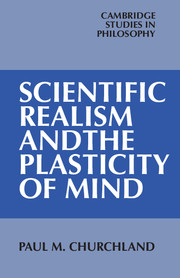2 - The plasticity of perception
Published online by Cambridge University Press: 05 June 2012
Summary
The semantics of observation predicates
The guiding conviction of this chapter is as follows: perception consists in the conceptual exploitation of the natural information contained in our sensations or sensory states. This view will be articulated more fully as we proceed, but even in this rough formulation it suggests a question: how efficient are we at exploiting this information? The answer, I shall argue, is that we are not very efficient at it, or rather, not nearly as efficient as we might be. What needs to be made clear in the topic of perception is the truly vast amount of exploitable information, contained in our own sensations, that goes blissfully unexploited by our conceptually benighted selves.
As indicated earlier, this myopia appears remediable. Our current modes of conceptual exploitation are rooted, in substantial measure, not in the nature of our perceptual environment, nor in the innate features of our psychology, but rather in the structure and content of our common language, and in the process by which each child acquires the normal use of that language. By this process each of us grows into a conformity with the current conceptual template. In large measure we learn, from others, to perceive the world as everyone else perceives it. But if this is so, then we might have learned, and may yet learn, to conceive/perceive the world in ways other than those supplied by our present culture.
- Type
- Chapter
- Information
- Scientific Realism and the Plasticity of Mind , pp. 7 - 45Publisher: Cambridge University PressPrint publication year: 1979

